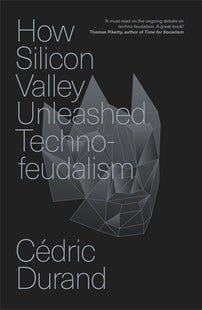From Cyberpunk Dystopia to the Techno-Feudalism of Today
“The mounting discussion of ecological collapse brings the cyberpunk dystopia into the present.”
On 1 March 1990, US Secret Service agents armed with a search warrant broke into Steve Jackson Games – a small company based in Austin, Texas, which designs and publishes role-playing games (RPGs). The officials seized three computers, two laser printers, some floppy disks, and various papers.
But their haul also included a manuscript. This was the latest ‘GURPS’ – Generic Universal RolePlaying System – a product that the company had made its speciality. Entitled ‘Cyberpunk’, this was a genre toolkit made up of rules, characters, and scenarios that form the building blocks of the universe that players are encouraged to bring to life. Its editor, Loyd Blankenship, had been arrested shortly beforehand for alleged hacking offences. He was also the author of a hacker manifesto published in 1986, and investigators were coming after him. The Bell telecommunications company had noticed that a file mapping the organisation of the 911 emergency system had been copied onto a server named ‘Illuminati’ that was administered by Blankenship. The judicial proceedings were soon dropped. But the book in question – which authorities described, with no little overstatement, as a ‘manual of computer crime’ – reaped huge publicity from this episode.
In the ‘Economics’ section of this text, the idea of techno-feudalism is introduced under the heading ‘Corporations’:
As the world becomes tougher, the corporations adapt by becoming tougher themselves, out of necessity. This ‘we protect our own’ attitude is sometimes called techno-feudalism. Like feudalism, it is a reaction to a chaotic environment, a promise of service and loyalty from the workers in exchange for a promise of support and protection from the corporation . . . In an unregulated world, corporations can band together, forming quasi-monopolies where all can maximize profit by reducing consumer choice, and by taking over or eliminating competition that tries to defy their pacts.
Blankenship offers players a cyberpunk dystopia in which there is no counterweight to big business’s power. Giant corporations, more powerful than the state, become the dominant forces in society. As a result, the role of the citizen is marginalised in favour of various stakeholders (shareholders, workers, customers, creditors) tied into these companies. So, the predominant social relationship outlined here is defined by attachment – that is, individuals’ dependence upon private companies. Firms have become protectors, islands of stability in a chaotic world. These powerful private monopolies have risen above governments to the point of becoming fiefdoms. The managements of the big firms enjoy a combined political and economic power over the social spaces that they control, and over the individuals who inhabit them.
Of course, this cyberpunk projection from the 1980s did not claim to have any kind of predictive powers. This was just a playful fantasy that might be able to provide us with the keys to understanding the contemporary world. And yet . . . just a few decades on, it’s hard to avoid noticing that some of the inklings expressed in this fantasy are highly relevant to our own present.
Firstly, it is undeniable that multinationals have considerably extended their grip over contemporary societies. And it’s not just a question of size. With telematics, intellectual property rights, and the centralisation of data, much tighter control is being exerted over territories and individuals.
Secondly, while governments are not retreating from this position per se, there are signs that their hold is weakening relative to large corporations. For example, the effective tax rate for multinationals fell from over 35 per cent in the 1990s to less than 25 per cent in the second half of the 2010s. At the same time, business circles have considerably increased their ability to hold sway over politics, as they have stepped up spending on lobbying and expanded their ever-less-subtle bids for influence, far removed from formal democratic procedures.
Democracy, exhausted by its loss of substance, is running out of steam, and the reconfiguration of the electoral field in high-income countries points to the weakening of the liberal political order. Today, this auxiliary of the modern state is faltering under the pressure of yawning inequalities.
As for the world becoming more chaotic, there are various signs that lend credence to this idea. The mounting discussion of ecological collapse brings the cyberpunk dystopia into the present. And one of the possible responses to systemic vulnerabilities is a securitarian agenda designed to contain the threat of social chaos.
These considerations do not prove anything. They are mere pointers, echoing the hunch that we are faced with a techno-feudal regression. This offers us a thread to pull on, a lead to delve into, a possible starting point. Nothing more. But a start is already something, if we want to tackle one of the key questions of the political economy of our time: What do capitalism and digital technology have to do with each other? How do the profit motive and the fluidity of the digital world interact? Could it be that a change of systemic logic is taking place – but that our vision is so clouded by capitalism’s overlapping crises that we haven’t seen it clearly yet?
—How Silicon Valley Unleashed Techno-feudalism: The Making of the Digital Economy by Cédric Durand. Translated by David Broder.
[book-strip index="1" style="buy"]

